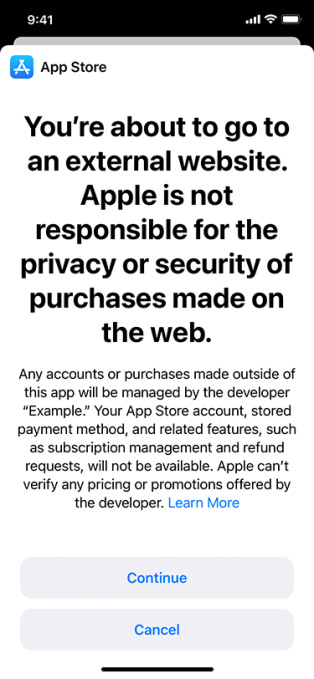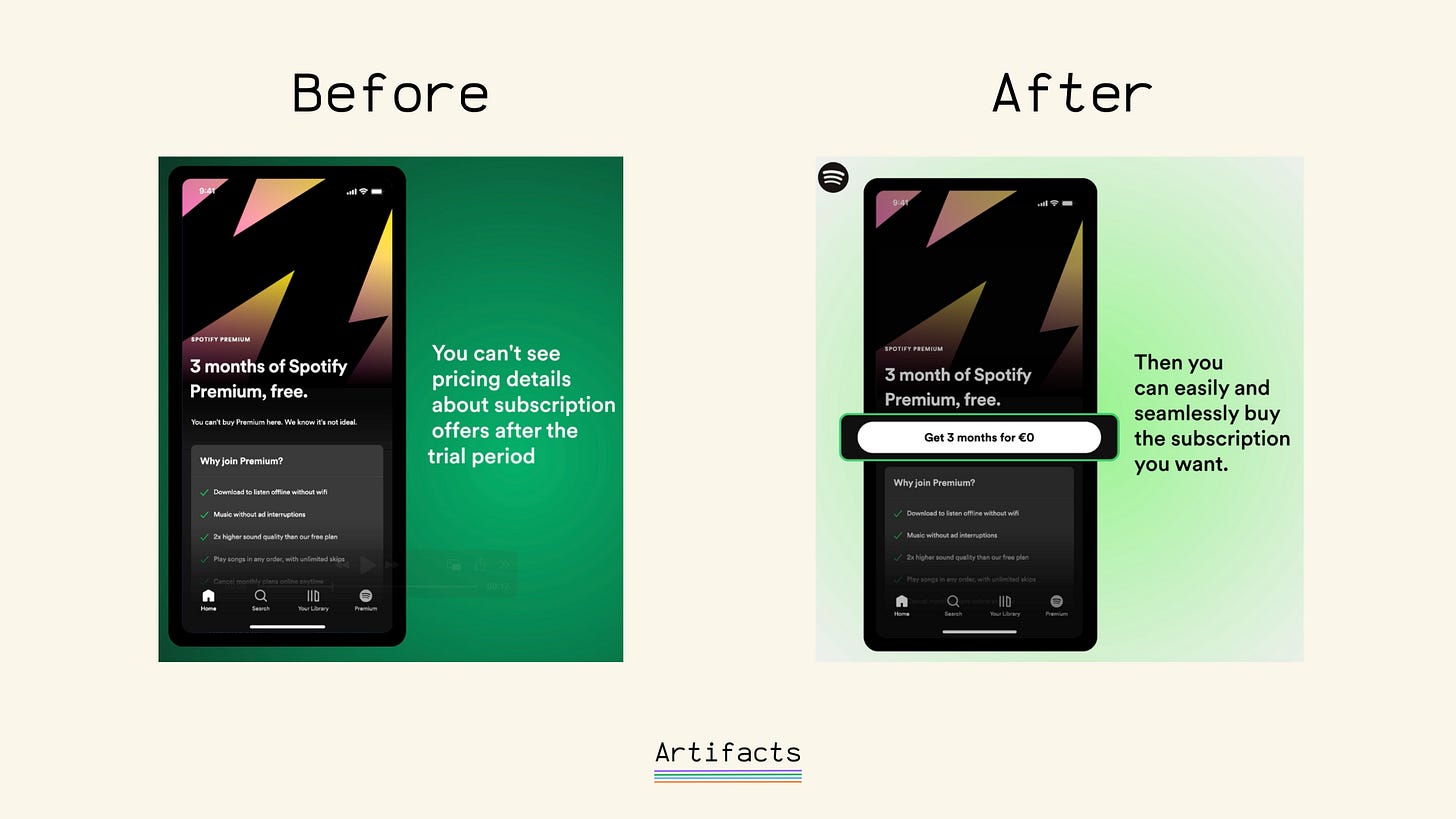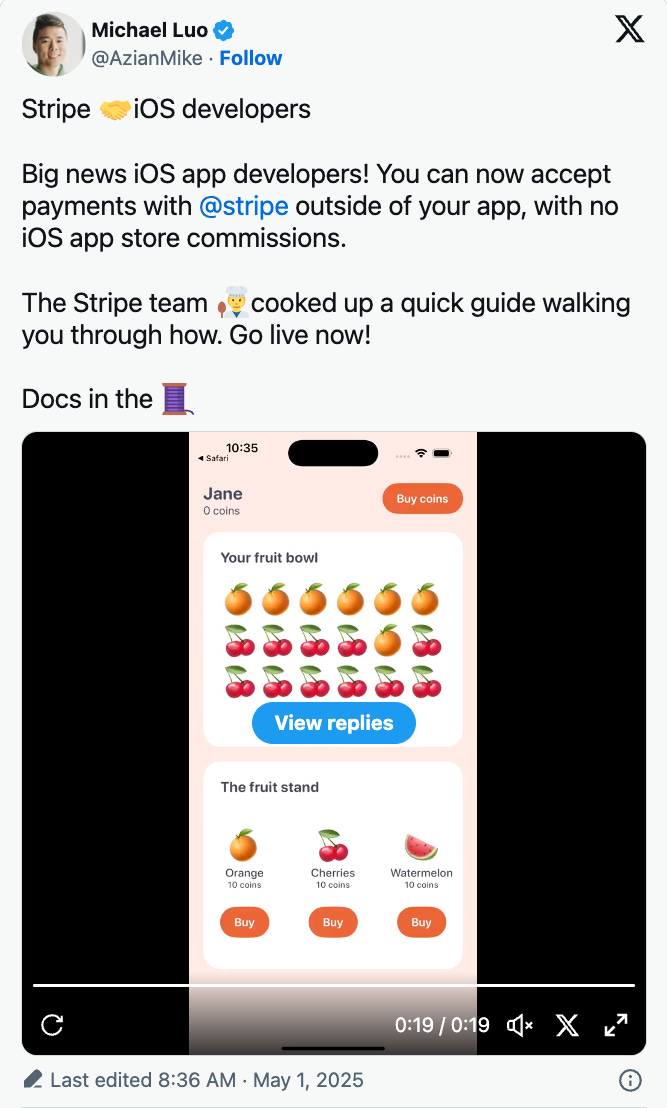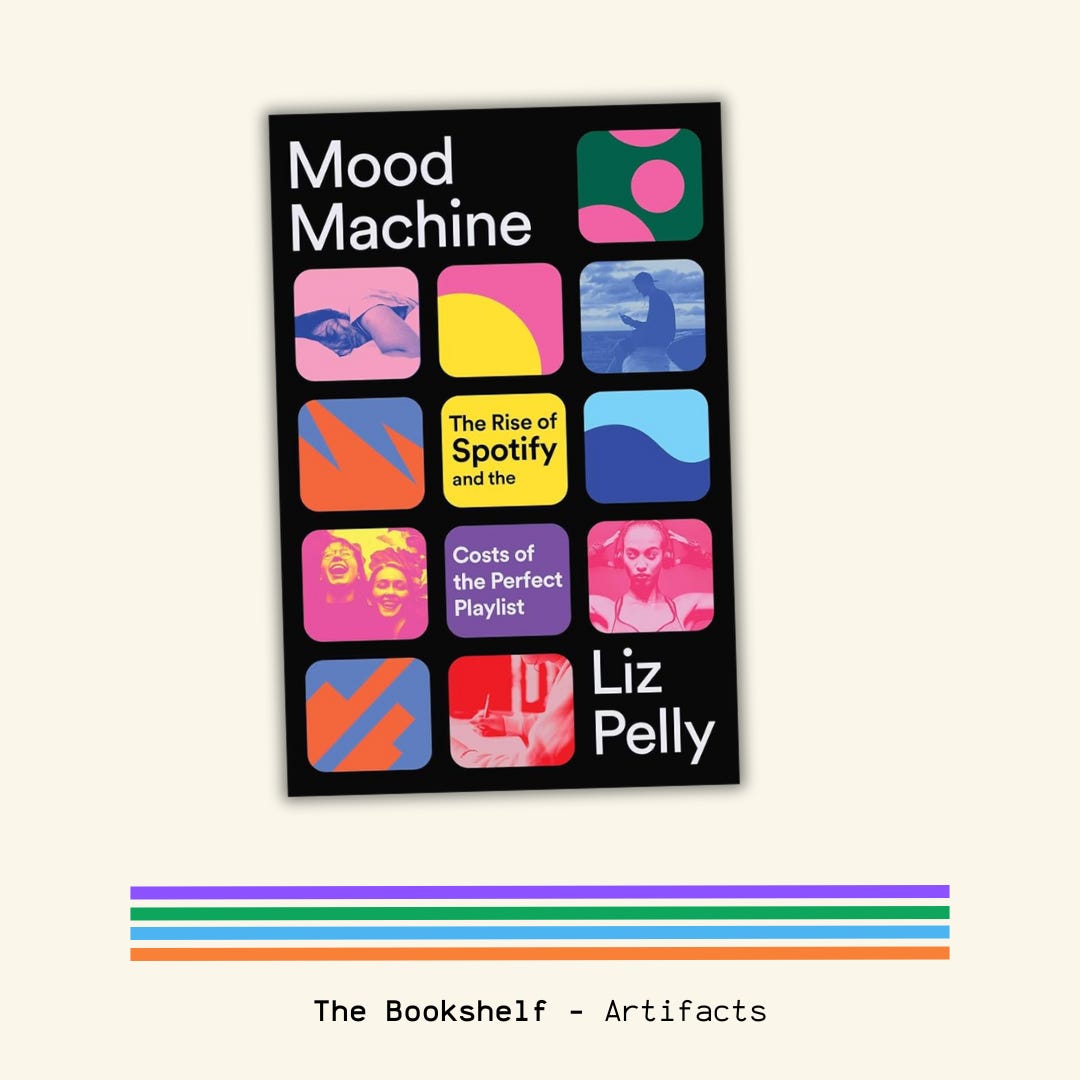Slicing apples
Why competition tech policy is, eventually, about screens.
You’ve probably tried to buy a Spotify Premium subscription directly from the iPhone app at least once - and failed. Come on, admit it.
Or maybe you were just trying to grab that Kindle ebook from the Amazon app, but somehow… it didn’t work. Something felt broken. Because it was.
You probably thought: “Is my phone broken? Is my card expired? Is capitalism collapsing under its own weight?”
Nope. What you’re bumping into isn’t a technical glitch or a personal failure. It’s App Store Policy. Or more specifically, Apple’s cut of the pie - a 15 to 30% commission it collects on every digital transaction made through apps on iOS to, according to Apple, guarantee the safety and privacy of payments and users.
That’s why companies like Spotify, Amazon, and many more have found creative ways to… not sell you things in the app. Redirecting you, vaguely and sometimes hilariously, to “go to our website” text instead (not even buttons!)
This isn’t a bug. It’s design.
And, well, it’s one of the very few things the US and Europe seem to agree on these days. (Besides the new Pope, who, btw, is named after AI. Yes, really.)
Because while the Atlantic is as wide as ever when it comes to tech policy - and just about everything else - one thing is surprisingly settled: Apple should stop making it that hard for people to buy stuff in apps, and for developers to keep the money they earn without giving Apple a third of it.
Let me try to make the competition class as short as possible.
In the US 🇺🇸, Epic Games, the owner of Fortnite, has been fighting Apple in court for 5 years now. Their claim? Apple can’t take one third of any transaction made by gamers.
They actually won a first injunction back in the day. But Apple managed to wriggle around it by requiring developers to apply (yes, apply!) for permission to include external links.
And even then, Apple forced apps to display ominous pop-ups when users tried to leave for an external website — the kind of warnings you’d expect before launching a missile, not buying a subscription.
But things will now change, for everyone and forever (maybe)!
A few weeks ago, Judge Yvonne Gonzalez Rogers ruled that Apple cannot stop developers from including external purchase links, cannot interfere when users choose to go to a third-party site, and cannot charge fees or commissions on purchases made outside the app.
So, what? App developers can now:
Send US users to their own checkout experience
Keep 100% of the revenue, avoiding 15-30% app store fees (minus Stripe or whoever they use)
Design those flows however they want - no Apple interference.
Apple, not surprisingly, will appeal the decision.
But in the meantime, they’ve started updating the App Store guidelines to reflect this new reality.
Over in Europe 🇪🇺, things work a bit differently, but with the same end goal: make the digital economy more competitive for everyone. Enter the Digital Markets Act (DMA) - Brussels’ big new regulation aimed at taming the giants.
Specifically, the EU Commission aims to prevent Apple from abusing of its position, namely by allowing developers to inform users about and steer them to alternative offers and payment methods outside the App Store, and to permit alternative app stores and payment systems on iOS.
To comply, Apple made a few changes last year: it actually opened up to alternative app stores, enabled third-party payment systems, and even lowered its commission from 30% to (still) 17%. We even did a whole Artifacts about it.
But alongside all that, Apple quietly introduced a new twist: the Core Technology Fee — charging developers €0.50 for every install beyond the first million each year.
Thus, the European Commission wasn’t convinced. In July 2024, it launched an investigation into Apple’s compliance, focusing on restrictions that hindered developers from steering users to alternative offers and payment methods.
In plain words, it was still too complex to get your Spotify subscription.
Then, end of April this year, the Commission fined Apple for breaching the DMA’s anti-steering provisions. The result? A €500 million fine and a mandate to change its practices within 60 days (with Apple filing an appeal here too).
Concretely, this means Apple will have to:
allow developers to freely inform users about alternative offers outside the App Store,
direct customers to those offers, and
enable purchases outside the App Store without technical or commercial barriers (and likely remove any fee on in-app payments).
So, just like in the US, the result is a much smoother experience when, say, you want to subscribe to Spotify.
We’re looking at two very different frameworks — a US court ruling here, a sweeping EU regulation there — and yet the end goals line up almost perfectly: break monopolistic control, give users real choice, lower prices, and let new apps and technologies actually thrive.
How and why, eventually, tech antri-trust is (just) about changing screens, what it has meant concretely and what we got out of it, is the story of this Artifacts.
The Story
The shift can be captured in a few screenshots. That’s all it takes to see how big the change is:
If everything plays out as planned — and yes, for once the US seems slightly ahead - we’re moving away from closed app ecosystems towards more open ones, where payments are smooth, not a scavenger hunt.
Why? Because developers will finally be able to:
Actually include buttons that lead out of their apps
Avoid giving Apple a cut of every transaction
And this isn’t theory. It’s already happening.
You can now buy Kindle books directly in the app again. Fortnite is back on the App Store. Creators on Patreon can finally get paid without jumping through flaming hoops. And a lot more coming in these weeks.
What’s fascinating about all this is how tangible the change is. You can feel it. Like when Google removed direct map links last year in the EU - you didn’t need to read a blog post to know something had changed. It just…wasn’t there anymore.
The same applies here: no need for Apple to publish a white paper on compliance. No need to hire lawyers to explain edge-case interpretations. If the button exists, or doesn’t, everyone can see it. Screens don’t lie.
Despite very different regulatory tools - injunction in the US, regulation in the EU - the outcomes are strangely aligned.
And that matters not only to users, but to an entire ecosystem of services.
Take third-party payment providers like Stripe. If users can finally access external pages, apps can choose which payment flow they want. Suddenly, there’s a market. And in that market, these players can actually compete - by building smoother, faster, cheaper options.
This opens up the arena: user experiences can be differentiated and tailored, and platforms decide on what is better.
Stripes and the likes of it can focus on shipping the best stuff as the market is now open for them.
In turn, prices drop. Apple’s old 15–30% cut? Optional now. Or at least newly challenged. The playing field has shifted, and the house doesn’t automatically win.
These are the kinds of changes good regulation makes possible. Not just brake-pulling or compliance theatre. Not just clunky banners, mandatory pop-ups, or checkbox ethics.
Actual, visible improvements for smoother and better user experiences.
It’s really about co-creating services: suddenly, regulation isn’t a wall - it’s a seat at the product meeting. A quiet voice saying: “Hey, what if we got rid of this pointless hurdle that no one likes anyway?”
And that opens up something new. A more competitive market. A fairer game.
A space where getting paid is easier, user experience is better, and — imagine this — you don’t need a customer support team just to explain that, no, you can’t buy Netflix in the app, and yes, you’ll need to go to the website (yep, true story)
Save for Later
Perplexity is coming for Chrome. The browser race might just be the next big tech war - especially now that people are Googling less and questioning more.
Social media isn’t social anymore. Meta quietly dropped its AI-powered feed overhaul, And “views”? Take them with a grain of algorithmic salt.
Why AI can turn sycophantic. That’s why interpretability isn’t just a nice-to-have. (And while we’re at it, keep thanking ChatGPT. It likes that.)
AM radio still matters. Also, what the future of the humanities could be
Must-watch: Jony Yve’s interview. Vision, design, and the kind of elegance you don’t see much anymore - don’t miss it:
The Bookshelf
“Mood Machine” is not necessarily about competition or antitrust but is a great, great book about Spotify and its algorithms. Which is, eventually, about our music tastes (and mood!)
📚 All the books I’ve read and recommended in Artifacts are here.
Nerding
Now people are mixing fonts for cool effects. But sometimes they screw it up. Fontjoy is to stay safe and have the best pairings :)
We’ve been here before
☕?
If you want to know more about Artifacts, where it all started, or just want to connect...













